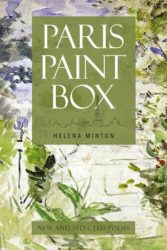Poetry Review: Helena Minton’s “Paris Paint Box” — Filled with Delight and Wisdom
By Ed Meek
 Poet Helena Minton deserves our attention; her verse is grounded in a close observation of nature and a love of language.
Poet Helena Minton deserves our attention; her verse is grounded in a close observation of nature and a love of language.
Paris Paint Box, New and Selected Poems by Helena Minton. Loom Press, 180 pages, $20.
Reading the selected poems of a writer provides us with an invaluable opportunity to reevaluate his or her work over a span of years. In this case, stretching from the ’70s to the present, Helena Minton’s recent volume gives us a chance to revisit many poems that had first appeared in journals and literary magazines. The first good poem of hers I ran into, oh, let’s say about 40 years ago in Poetry Magazine, is called “Bread.”
Dough rises in the sun,
history of the human race inside it:
orgies, famine, Christianity,
eras when a man could have his arm
chopped off for stealing half a loaf.
I punch it down, knead the dark
flour into the light, let it bake,
then set it on the table beside the knife,
learning the power
cooks have over others, the pleasure
of saying eat.
Minton knows how to move, with ease, from accumulating concrete details to making abstract statements that resonate. She also is capable, in many poems, of a light touch: she is willing to include orgies, famine, and Christianity in one line. She has a good ear as well: “half a loaf” picking up from beginning with “Dough.” And there’s a little edginess with the insertion of a knife into the poem, before she closes with a satisfying declaration. If you’ve ever made bread or if you cook, you know the feeling she’s talking about.
Minton has a wide-ranging appetite for subjects, among them: flowers, bees, trees, and rivers. Her poems, like those of William Stafford, Richard Hugo, and Robert Frost, are grounded in a close observation of nature and a love of language. From “Perennial Bed”:
In September the bees spend hours
on the saucers of rose sedum,
their curled legs moving over petals
fleshy as rubber brushes.
As in “Bread,” the language is oxymoronic: lively movement under pressure. Like Stafford (“What the rivers says, this is what I say.”), she has quite a few poems about rivers. One is about the Merrimack.
I walk a path built of granite,
wooden rail at the level of my hand.
I want to follow the entire river
as it flows through names
I’ve seen on maps: Manchester, Concord,
city of peace, of smooth, fat grapes
and the villages: Tilton, Riverhill.
That’s a quiet, assured voice that wants us to reconsider the role of rivers, to appreciate their beautiful names and the thousands of towns and cities built along them.
In “Standing at the Trellis Before Supper,” she claims: “It’s always better to let someone/ underestimate you. / Did the string bean say that?” It’s an old school point of view that we could use more of in today’s nonstop self-promotional world. The string bean perfectly illustrates that admirable modesty. Note: Thoreau spends a chapter in Walden insisting that string beans are the perfect vegetable to grow.
Minton does not hang back. She is willing to take on weighty topics, such as our relationship with the past. In “The Dead Keep Us Company,” she begins with: “Now when we speak / they don’t interrupt. / They let us win every argument.” She winds up by reminding us that winning isn’t everything: “Off hand, they tell us / what no one else / has the heart to.” As we age, we spend more time conversing with those we have lost and, as she suggests, being reminded, if we dare to listen, of what they told us.
“The Visit” brings us into a prison, where: “The first thing you ask for is a map / but they won’t give you one.” Once inside,
A visitor, like you, gives up
his license, his car keys, money…
They don’t want you to know
where you are, as if you were blindfolded
and spun around, without the blindfold
with no point of reference,
no point of origin or destination.
Minton takes us into the very small world of the prisoner, “a box within a box.” And “what they deprive him of … they will deprive of you, too.” In this and so many other poems she has us rethink parts of reality we tend to overlook.
“Contemplations” like “Sketches for Edward Hopper,” invites us into a bleak environment. “She drove home in the dark in a downpour. / He bowed his head before an open window.… She pulled the shade down inside herself.… Leaves like those of a locust appeared lined up in a derelict wind.” Bleakness in poetry, however, as Robert Bly points out, is an invitation to meditate on what’s important.
“The Paris Paintbox,” the first 50 pages of the collection, is based on Minton’s research into the life and art of impressionist artist Berthe Morisot, a “painter of the early morning light” who is finally receiving the serious attention she deserves. I’ll leave those for you to enjoy. Like the painter she depicts, this poet deserves our attention. Her poems, like Robert Frost’s, are filled with delight and wisdom.
Ed Meek is the author of High Tide (poems) and Luck (short stories).
